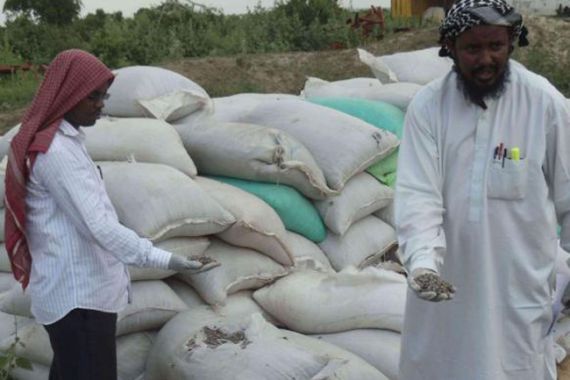Al-Shabab bans Red Cross from Somalia
Armed Islamist group accuses organisation of distributing outdated food and “betraying the trust” of its fighters.

 |
| Al-Shabab allege that the Red Cross was distributing outdated food in Somalia [@HSMPress] |
Somalia’s al-Shabab has banned the International Committee of the Red Cross (ICRC), ordering it to close its emergency relief operations in the regions it controls.
The armed Islamist said in a statement on Monday that it had “decided to fully terminate the contract” of the ICRC, claiming the organiation had handed out outdated food and had “falsely accused the mujahideen [al-Shabab] of hindering food distribution”.
Keep reading
list of 4 items‘Mama we’re dying’: Only able to hear her kids in Gaza in their final days
Europe pledges to boost aid to Sudan on unwelcome war anniversary
Birth, death, escape: Three women’s struggle through Sudan’s war
Al-Shabab control large parts of south and central Somalia, a region the UN says is currently experiencing the world’s worst humanitarian crisis, with three areas still categorised as famine zones affecting nearly 250,000 people.
The ICRC had already suspended food aid to 1.1 million people in southern and central Somalia earlier this month, due to obstruction by local armed groups, including in al-Shabab-controlled regions.
The aid suspended included food as well as seeds for farmers, and was intended to be given to the thousands struggling from years of war and the impact of a devastating drought that has ravaged Somalia since October 2010.
However, the ICRC had continued to provide emergency aid including supporting health programmes and providing clean water.
Al-Shabab said the ICRC had “betrayed the trust” of the fighters, and said it had set fire to “nearly 2,000 metric tonnes of expired ICRC rations intended for distribution”.
On Twitter, al-Shabab’s press office tweeted that the group’s Office for Supervising the Affairs of Foreign Agencies said “a thorough inspection of ICRC warehouses revealed that 70 per cent of the food stored for distribution was deemed unfit for human consumption”.
Prominent journalist murdered
Meanwhile, the human rights group Amnesty International (AI) urged the international community on Monday to call on the Somali authorities to bring to justice those responsible for attacks on journalists after the latest killing of a Mogadishu reporter.
Hassan Osman Abdi, director of the Shabelle Media Network, was shot by unidentified men outside his home in the city’s Wadajir district on Saturday evening. He reportedly died on his way to hospital.
The reporter, also known as ‘Hassan Fantastic’, is the second journalist to be killed in the last six weeks in Somalia.
Nazanine Moshiri, Al Jazeera’s East Africa correspondent, who had interviewed Abdi in the past, said: “He was extremely brave talking to Al Jazeera on camera using his real name … he actually told me he did not care what happened to him, and he simply had to speak to truth.”
The Somali authorities say they are investigating his killing.
“The numerous attacks on journalists in Somalia have been part of an attempt to silence reporting about human rights abuses by all parties to the conflict in the country,” Erwin van der Borght, AI’s director for Africa, said.
“Despite Somalia’s Transitional Federal Government’s promises to investigate these killings, no one has ever been brought to justice for such acts.
“It’s time that the international community takes concrete measures to tackle impunity for the killings of journalists in the country and other human rights abuses.
“Anyone found responsible for committing or ordering the killings must be brought to justice, in fair trials and without the application of the death penalty.”
New approach to Somalia
Somalia, ravaged by nearly uninterrupted civil war for the past two decades, is one of the most dangerous places in the world for aid workers and one of the regions that needs them most.
In February 2012 the United Kingdom will host up to forty governments, the UN and regional bodies like the AU for the London Somalia conference in a bid to resolve the deteriorating situation in Somalia,
In November 2011, al-Shebab ordered shut 16 UN and other international aid agencies after raiding several of their offices, banning organisations it deemed “engaged in activities deemed detrimental to the attainment of an Islamic state”.
Those raids left just a handful of aid agencies able to operate in rebel-held areas, including the now-banned ICRC and Medecins Sans Frontieres (Doctors without Borders).
Armies from neighbouring countries are converging on al-Shebab, with Kenyan troops crossing into Somalia from the far south in October, and Ethiopian troops marching in from the south and west in November.
The African Union Mission in Somalia has about 10,000 troops – from Uganda, Burundi and Djibouti – in the Somali capital Mogadishu to protect the fragile Western-backed Somali government.